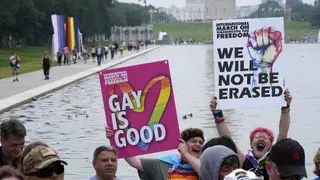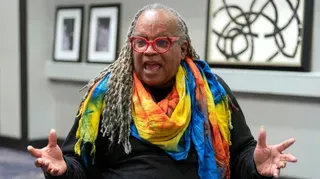September 18, 2012
A New Home for Y-HEP to Fight HIV, Teen Homelessness
Aaron Stella READ TIME: 4 MIN.
On September 12, Philadelphia's Youth Health Empowerment Project celebrated their Grand Reopening, moving into a new home on Locust Street just blocks away from City Hall in the heart of the city. The new space is perfected for this multi-faceted, community-based health program to continue helping Philadelphia's struggling LGBT youth battle against HIV and homelessness.
"With our new location, we have the opportunity to implement new, creative, innovative ways to educate Philadelphia's youth about health and wellness, and provide the tools they need to make good life choices," saidY-HEP's Director Katie Dunphy, LSW, MPH.
Distinguished members of the community attended to show their support and tour the center, including State Senator Larry Farnese, Councilwoman Blondell Reynolds-Brown and State Representative-elect Brian Sims.
Y-HEP began in 1994 as a citywide pilot project to reduce the spread of HIV and STIs among adolescents and young adults in the Philadelphia area. Now, it is a comprehensive program that serves high-risk, hard to reach teens and young adults aged 13-24 through a range of activities and support.
According to a recent report by the NGLTF, there are 3,275 homeless LGBT youths, nearly half under 18-years-old, in Philadelphia any given year. Given these numbers, YHEP needs all the help and room they can get.
"The old space was the size of the living room space Y-HEP's new home," said Tareem, Y-HEP's Program Coordinator for their I AM initiative.
The organization's new, two floor, 6000-plus square-foot location contains a group workroom, computer lab with seven workstations, multimedia center, family planning clinic, private rooms for HIV testing and counseling, space for individual therapy, a shower room, prep kitchen, offices for Y-HEP's staff of 15, and drop-in center called the "T" Room, which Tareem supervises.
Most first-time clients to the clinic have been recommended by someone who volunteers for or works at Y-HEP. Many LGBT adolescents who come to Y-HEP have fallen through the cracks, unable to acquire the care they need or even know that they need it in the first place.
"It's an intense population," said in-house therapist Deb Callahan, who has been with Y-HEP for nine years. "Most of our clientele are kids in transition: they're couch-surfing, in child foster care or the child welfare system, living very unstable lives in lot of different places, often without consistent support and love. Callahan talked about a male-to-female transgender youth she had been working with.
"Her grandmother is a super religious African-American woman who when the transgendered kid came out of the closet, was like, 'I'm sorry. If that's who you are, I can't live with that.' So she is here with us, and we are working with other agencies to help her get help," said Callahan.
In addition to government-funded agencies, businesses throughout Philadelphia also offer support to Y-HEP. Buffalo Exchange and City Blues give weekly donations to Y-HEP of clothes and shoes that go to homeless LGBT teens. Sneaker Villa recently donated a huge box of shoes to the drop-in center.
"This new space is more welcoming to the young people we serve, which gets them off the streets and in a safe location where they can take advantage of the services we provide," said Dunphy.
Y-HEP's portfolio of offerings is comprehensive: HIV counseling, testing and prevention education; therapy for young adults coping with low self-esteem, experiences of trauma and anger management; workshops in leadership development and peer advocacy; job and computer skills training; support groups for young men, women and those using drugs and/or alcohol; a family planning clinic; and the I AM Initiative, dedicated to enhancing HIV prevention and care services for young men of color who have sex with men, and their partners.
While homeless LGBT teens have their own unique struggles, they face even greater travails in that when they reach 18, they're no longer eligible to take part in foster care or group homes. Health issues also remain a constant, but when a youth has trouble acquiring basic necessities, health becomes the least of their worries.
Thankfully, Y-HEP is backed by Philadelphia FIGHT, a comprehensive AIDS service organization providing state-of-the-art, culturally competent HIV primary care, amongst various other services. Because of FIGHT, Y-HEP can attend to homelessness and the spread of infectious diseases amongst LGBT youth.
"We're a gem in the community right now," said Tareem. "We're providing services that a lot of organizations in the community can't provide. We are that extra support for our youth."
For more info, visit www.y-hep.org/







